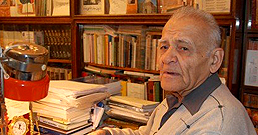Muhammadjan Shakuri is a leading contemporary Tajik scholar of history, culture, Persian language and literature. Shakuri has published over forty books and five hundred articles. Now at the age of 85, he has decided not to publish any more blaming old age.
Shakuri was born in Bukhara, a historic city and a cradle of civilization in Central Asia. Bukhara, for over a millennium, and until early 20th century, was also an important centre of Persian language and culture. For many Bukharans and other Central Asians who spoke Persian, Bukhara was an ideal city, always referring to it as the noble Bukhara.
Shakuri’s attachment to Bukhara lies in its historical contours and multi-faceted cultural influences. He has followed the historical trajectory of the city from the Samanid period, through the times of the emirs into the Soviet period and up to the establishment of the independent states of Uzbekistan and Tajikistan. Bukhara gained its prominence under the Samanids in the 10th century. Soon it came to be the bastion of arts, culture, Persian and Arabic language that rivaled Baghdad, the capital of the Islamic Caliphate.
With the collapse of the Emirate of Bukhara, the city lost its political and cultural importance and ended up as a tourist attraction in the republic of Uzbekistan.
Shakuri and many other Persian/Tajik speakers and intellectuals of his time moved from Bukhara, Khojand and Samarkand to Dushanbe, the capital of Tajikistan.
Shakuri was always hopeful that the city of Dushanbe would become the centre of Tajik culture and Persian language like Bukhara. Tajik poets, intellectuals and writers led by Sadriddin Aini, attempted to preserve and protect their cultural identity amidst a sea of Turkic republics in this burgeoning new region.
It was very painful for Tajik intellectuals such as Shakuri to see the demise of the Persian language. Not only was it no longer the lingua franca of the region, but its very existence was under thereat from the supremacy of Russian language and culture and the Soviet ideological inroad into all corners of Tajik life. He was especially concerned with the impact of Russian colloquial language and modern cultural modes of expressions such as music, novel writing, theatre, ballet and opera. The Soviet official policy worked hard on a narrative that Tajiks of Central Asia are not related to the Iranians or Persians.
Shakuri and other likeminded Tajik thinkers and scholars worked tirelessly to undermine this policy; and also to preserve and revive all aspects of Tajik culture ranging from literature to language and history. Furthermore, through his scholarship and research Shakuri has tried to showcase the link between Tajik Persian and its Iranian influences and at the same time strived to increase Tajiks’ knowledge of their contribution to Iranian culture and history.
Two of Shakuri’s more notable accomplishments include the Tajik Persian Dictionary and his historical research entitled “This is Khorasan”.
The prolific thoughts and ideas of Muhammadjan Shakuri have not only profoundly impacted Tajik intellectual tradition, but they continue to influence and shape contemporary Tajik identity.


